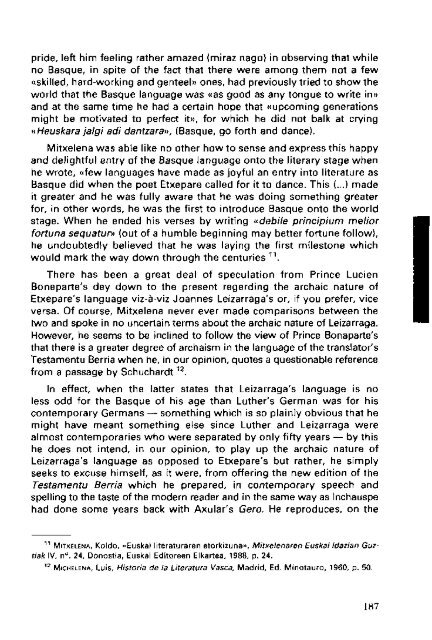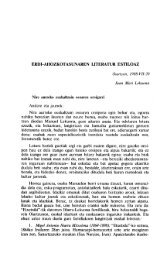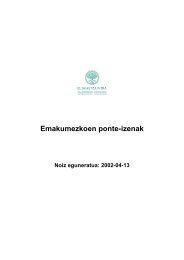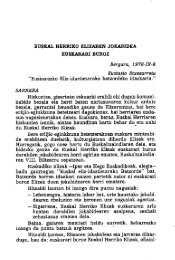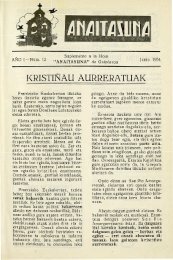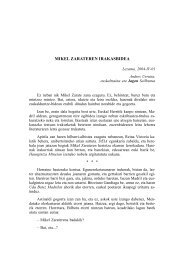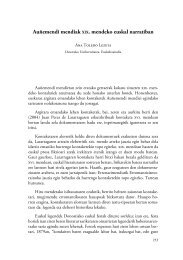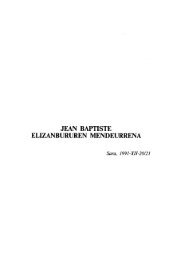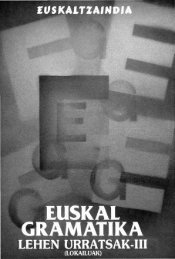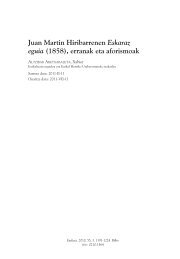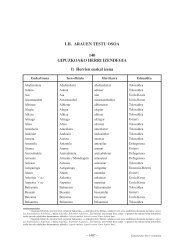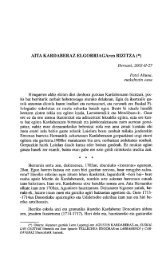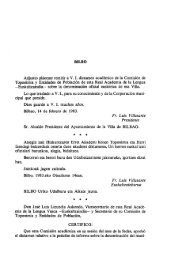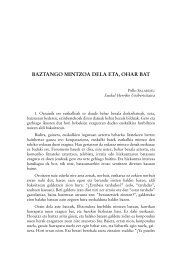LINGUAE VASCONUM PRIMITIAE - Euskaltzaindia
LINGUAE VASCONUM PRIMITIAE - Euskaltzaindia
LINGUAE VASCONUM PRIMITIAE - Euskaltzaindia
You also want an ePaper? Increase the reach of your titles
YUMPU automatically turns print PDFs into web optimized ePapers that Google loves.
pride, left him feeling rather amazed (miraz nago) in observing that while<br />
no Basque, in spite of the fact that there were among them not a few<br />
«skilled, hard-working and genteel» ones, had previously tried to show the<br />
world that the Basque language was «as good as any tongue to write in»<br />
and at the same time he had a certain hope that «upcorninq generations<br />
might be motivated to perfect it», for which he did not balk at crying<br />
«Heusksre ja/gi adi dentzere», (Basque, go forth and dance).<br />
Mitxelena was able like no other how to sense and express this happy<br />
and delightful entry of the Basque language onto the literary stage when<br />
he wrote, «few languages have made as joyful an entry into literature as<br />
Basque did when the poet Etxepare called for it to dance. This (...) made<br />
it greater and he was fully aware that he was doing something greater<br />
for, in other words, he was the first to introduce Basque onto the world<br />
stage. When he ended his verses by writing «debile principium me/ior<br />
fortuna sequetur» (out of a humble beginning may better fortune follow),<br />
he undoubtedly believed that he was laying the first milestone which<br />
would mark the way down through the centuries 11,<br />
There has been a great deal of speculation from Prince Lucien<br />
Bonaparte's day down to the present regarding the archaic nature of<br />
Etxepare's language viz-a-viz Joannes Leizarraga's or, if you prefer, vice<br />
versa. Of course, Mitxelena never ever made comparisons between the<br />
two and spoke in no uncertain terms about the archaic nature of Leizarraga.<br />
However, he seems to be inclined to follow the view of Prince Bonaparte's<br />
that there is a greater degree of archaism in the language of the translator's<br />
Testamentu Berria when he, in our opinion, quotes a questionable reference<br />
from a passage by Schuchardt 12.<br />
In effect, when the latter states that Leizarraga's language is no<br />
less odd for the Basque of his age than Luther's German was for his<br />
contemporary Germans - something which is so plainly obvious that he<br />
might have meant something else since Luther and Leizarraga were<br />
almost contemporaries who were separated by only fifty years - by this<br />
he does not intend, in our opinion, to play up the archaic nature of<br />
Leizarraga's language as opposed to Etxepare's but rather, he simply<br />
seeks to excuse himself, as it were, from offering the new edition of the<br />
Testamentu Berria which he prepared, in contemporary speech and<br />
spelling to the taste of the modern reader and in the same way as Inchauspe<br />
had done some years back with Axular's Gero. He reproduces, on the<br />
11 MITXELENA, Koldo, «Euskalliteraturaren etorkizuna», Mitxelenaren Euskalldazlan Guztiak<br />
IV, n", 24, Donostia, Euskal Editoreen Elkartea, 1988, p. 24.<br />
12 MICHELENA, Luis, Historia de la Literatura Vasca, Madrid, Ed. Minotauro, 1960, p. 50.<br />
187


